“Awakening Our Democracy: Free Speech on Campus” was a panel that took place yesterday, Wednesday, November 1st at Columbia Journalism School. Bwoggers Aliya Schneider and Kiana Taghavi attended the event. Read what they have to say, and check out some photos.
On Wednesday, the Office of University Life hosted a conversation with moderator Jami Floyd (WNYC host and legal and media commentator) and panelists Jamal Greene (Columbia Law School Dwight Professor of Law), Suzanne Nossel (PEN America Executive Director), and Tanya Hernandez (Archibald R. Murray Professor of Law, Associate Director, Center on Race, Law and Justice at Fordham Law School). Four student organizations – Students of Color Association, Engineering Student Council, CU Speak, and White Coats 4 Black Lives – co-sponsored the event. Executive Vice President of University Life Professor Suzanne Goldberg introduced the speakers and the purpose of the panel.
The goal of the event was to address overarching concerns around free speech, both on the university’s campus and in the public domain. Questions were submitted by the audience.
The panel began with a conversation regarding the extent to which speech should be free on a college campus. Greene stated that universities have to balance disseminating knowledge with the idea that community members can voice controversial language. Greene also acknowledged the private and public legal nuances in regulating free speech. Floyd took a few moments to pause the discussion and explicitly read aloud the First Amendment, bringing to light that the amendment refers to Congress, specifically, in terms of regulating free speech. While discussing whether or not hate speech should be protected or suppressed in academic settings, it was elucidated that other countries have strict regulations on hate speech, whereas the United States does not.
While recognizing that a lack of policing hate speech stems from a concern as to whom creates these restrictions, the panelists expressed their sympathy for potential regulations. Hernandez defended hate speech regulations by stating how racism is taught through language. She said, “Babies are not born racist.” She defined hate speech as racially assaultive speech and exclaimed how “hate speech gets an outsized proportion of prominence.” She claimed that there is no value to discourse that interrogates the humanity of people based on their racial background or on other vulnerabilities. Hernandez further expressed that if the value of hate speech is to encourage tolerance, racial minorities who are being marginalized are the ones who have an “outsized purpose to tolerate the assaultive language when no one else is tolerating it the same way.”
Greene argued that we cannot expect neutrality from college administrators when inviting speakers on campus. He said he has “no problem with college administrators denying certain provokers” an outlet to speak on campus; a college campus is very different from a public space. He suggested that we should consider what kinds of punishments we think hate speech should entail. He pointed out that not being given a platform and being thrown into jail are two very different consequences.
Nossel articulated that speech affects how students socialize in college environments and that students are unprepared to face the increasing diversity on college campuses. She indicated the benefit of student leaders connecting with free speech experts to find common ground and thinks that first-year orientation could be utilized as an opportunity for preparing students to thrive in diverse, educational atmospheres. Hernandez said that her law students underwent implicit bias training before starting their first semesters. She is a strong advocate for using educational environments as conversational spaces and believes that experiential learning can help people connect with their peers.
Greene pointed out that discussions regarding free speech often become accusatory. “Rather than think about who has a right to do this or that, think about how is it that we persuade each other about our ideas. There are strategies of persuasion that are distinct from just exercising your rights.”
Nossel said, “We try to address the competing needs for the campus to be an open, inclusive, and increasingly equal environment for students from all kinds of backgrounds, but also without compromising robust protections for free speech and academic freedom.”
To conclude the conversation, the panelists were asked if protests are an effective way of expressing dissent towards a speaker on college campuses. Greene believes that it is the institution’s job to create a regulated space, even if it is at the expense of excluding some speakers or some protesters from campus discourse. He accentuated that college campuses are different than public squares. Hernandez said protestors should consider what other outlets they have. Nossel believes that there are creative ways to protest and reminded us that when Milo Yiannopoulos was shut down, he became more of a public figure. Greene’s final answer to whether or not protests are effective ended the conversation. With a grin, he said, “Sometimes.”
A video of the event is posted on the University Life Website. Participate in #unitedCU to help define our community and our values here.
- Vice President of University Life Professor Suzanne Goldberg introducing the event
- Panelists discussing topics that were previously sent in by attendees
- Panelists discuss their approach to free speech values on campuses
- Panelists discuss their approach to free speech values on campuses
- Students ask questions during Q and A
- Students ask questions during Q and A
- Students ask questions during Q and A
- Kayum Ahmed, a student who was facing disciplinary action for protesting Tommy Robinson until it was recently lifted, speaking from the audience
Photos taken by Aliya Schneider


 1 Comments
1 Comments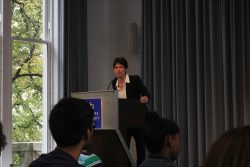
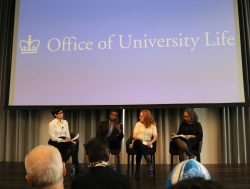
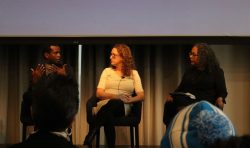
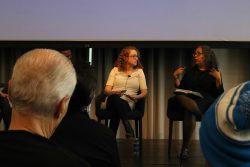
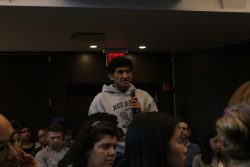
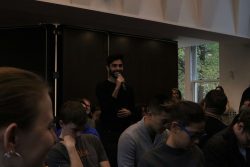
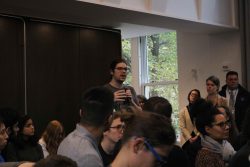
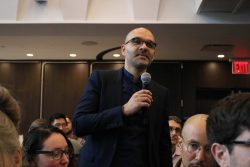

1 Comment
@Anonymous Compared to AltaVista, google is too curated to be free